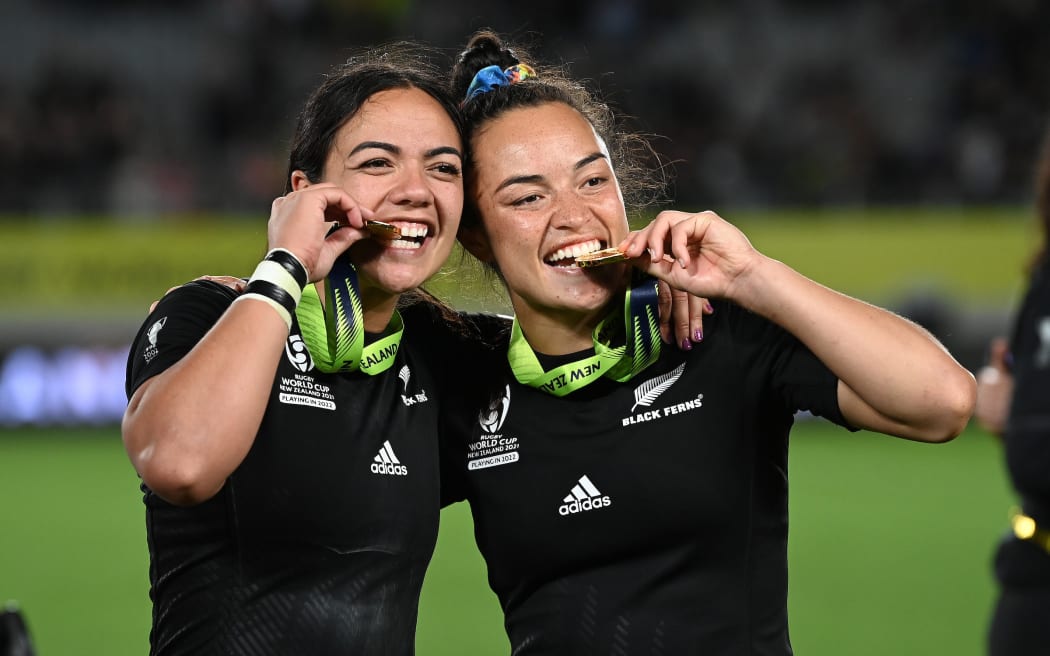When will women's success and inclusion stop being extraordinary?

Stacey Fluhler of New Zealand and Theresa Fitzpatrick of New Zealand celebrate with their winners medals. Photo: Andrew Cornaga / www.photosport.nz
Forty years ago, one of the first stories I wrote for a newspaper was about a woman working on a road crew.
A woman! Fancy that!
There were other stories in a similar vein after that. Air New Zealand's first female pilot in 1986, our first female Governor-General in 1990, and, of course, our first woman Prime Minister in 1997.
Since then there's been an avalanche of other firsts, expectations raised by the profiling and publicity, and the continuation of the 'girls can do anything' message.
Now with the success of three women's world cup hosting jobs behind us, and the whole country's embrace of the action, has New Zealand hit peak equality? Can I stop writing these 'first' stories?
"It's a tricky one, isn't it?" says associate professor of communication at Massey University Susan Fountaine, who keeps a close eye on how women are portrayed in the news.
"News is about the novel, the new, the first things to happen; and perhaps unfortunately in the gender environment that means we do have this emphasis on the first women to do particular things.
"I guess, and I hope, and I really like to think that the media is starting to normalise more the achievements of women, and I think we're seeing that particularly in politics."
Having high profile politicians, in particular female prime ministers, has had payoffs in terms of women's visibility in the media.
"I don't think the progress is always linear," says Fountaine, "but I do feel like there are moves towards normalisation in some of those achievements."
Fountaine speaks to The Detail today about the risk of the women we're elevating being turned into superwomen who people can't relate to – which is why diversity of voices in the media is so important.
"A role model has a better chance of being influential if they're somehow relatable to the person who's seeing them."
She's also concerned that some of her journalism students are becoming complacent, in that they seem to think all the battles have been won.
The Detail also speaks to Niamh Barraud, a qualified builder who runs her own company, Windy City Builders, and is on the board of NZ Certified Builders.
The organisation is launching a programme designed to provide wrap-around support to apprentices and their employers, which includes matching female trades trainees up with mentors.
It comes at a time when the industry is trying to widen its recruiting pool – and women are a largely untapped resource.
"It's a battle that every institution in the industry is focusing on now because diversity is becoming a much more important part of the industry," she says.
Officially, women in construction are 14 percent of the industry – which doesn't sound too bad until you realise most of those jobs are in support services. Barraud estimates the number of women on the tools is more like three percent.
She says we need to show women it's possible, and that includes images that normalise women on work sites, who have their tool belts on and are not the client or the builder's wife.
"We have to show girls that this is a viable career option ... we have to show their parents that it's a viable career option ... and we have to normalise the presence of women on site so that employers and colleagues value women on site."
Barraud also talks about the barriers still blocking women from a career in construction, including the strange reasons employers still use to not employ them.
If there's one series of events that's made great strides in equality, it's the trio of highly successful world cups New Zealand's just hosted and co-hosted.
Former Olympian heptathlete Sarah Cowley Ross, who writes for Newsroom's LockerRoom, has seen a real shift in the portrayal of women's sport and female athletes over that time.
She talks to The Detail about how she sees generational change through the attitudes of her children, who don't distinguish between men or women playing sport – because it's all good.
Listen to the full episode.
Check out how to listen to and follow The Detail here.
You can also stay up-to-date by liking us on Facebook or following us on Twitter.

Photo:


